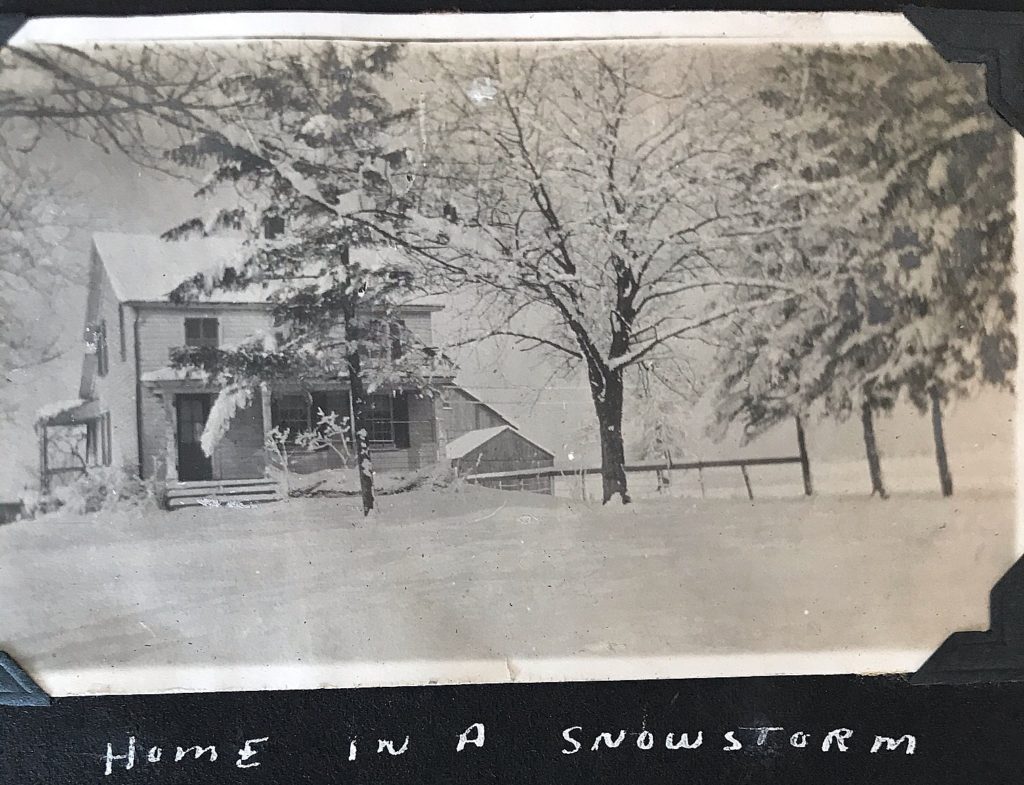Happy Valentine’s Day! I never really liked this holiday, to be honest. Love is such a deeply personal thing to me and Valentine’s Day seems so brash. BE MINE. KISS ME. I choose YOU. I always fell into the camp of those who wanted to rebel against the saccharine nature of it.
The holiday comes across much nicer, I think, in this phrase from an old newspaper:
February 14 is Valentine’s Day – a day in which love missives are exchanged between friends and between loved ones. The custom is founded and sustained by a sentiment which is as natural as it is beautiful.
The Brooklyn Citizen, 1913, Feb 09
Love. It’s way too big and complicated a topic for this post so I’ll politely remove love of God, love of neighbor, and romantic love from the discussion. In fact, I’d like to restrict today’s topic to “love of home”, in connection with the photo of the house where my grandmother and father grew up.

Not everyone experiences a “love of home” thinking about the place from which they came. Plenty of people had horrific upbringings or moved too much to feel that there was one established place to call home. Others see it as real estate, pure and simple.
I have the tendency to personify things so loving what is essentially bricks and mortar still makes complete sense to me. Whenever I read Howards End I feel a real sympathy for Mrs. Wilcox who loved her country house (and all its surroundings) so dearly. In the following passage, the narrator explains how Mrs. Wilcox wanted to bequeath the things she loved to someone who would appreciate them:
To them Howards End was a house; they could not know that to her it had been a spirit, for which she sought a spiritual heir…Is it credible that the possessions of the spirit can be bequeathed at all? Has the soul offspring? A wych-elm tree, a vine, a wisp of hay with dew on it—can passion for such things be transmitted where there is no bond of blood?
E.M. Forster, Howards End
In fact, Mrs. Wilcox’s feelings for her estate turned out to originate from E.M. Forster’s deep love for the house in which he grew up, called Rooksnest. “I took it to my heart and hoped…that I would live and die there”, he wrote. Like the character he created in Mrs. Wilcox, Forster understood how a lifetime of gathered sentiment could give life to a house:
Much more than just a house, for Forster, Rooksnest came to represent English country values—a connection to place, a respect for individuality, and a commitment to the contemplative life—that were increasingly threatened by the urbanization and industrialization sweeping Edwardian England.
Penguin Reading Guide for Howards End
Not having lived in my grandmother’s house, I can’t say I have too much of an attachment. Yet when I look at the photograph there’s a twinge of wistfulness. The farm in Howard’s End stood as a symbol of “the economic and social foundation of England, the centre of moral and social stability, of habit and custom”.
The same could be said of farm homes like my grandmother’s, in the U.S. It’s not that life was easier or better then (certainly not for most people) but that it had weight to it missing from the Age of Information. Work, leisure, family and friends weren’t spread over the physical and digital universe but within miles of that one plot of land:
In these English farms, if anywhere, one might see life steadily and see it whole, group in one vision its transitoriness and its eternal youth, connect – connect without bitterness until all men are brothers
E.M. Forster, Howards End
Connect – connect without bitterness. For me that means coming to terms with the fact that – yes – something has been lost. When my parents recently sold the house that I grew up in, my family lost the sights, sounds and smells that had been familiar to us for decades. But in that loss, we’re connected with everyone else because it’s such a universal experience.
No one says this better than Elizabeth Bishop in her poem “One Art”.

So that’s my act of rebellion for this Valentine’s Day. Instead of selfishness (BE MINE, KISS ME) I’m going to think about losing. If I know that everything I love will necessarily be lost, I can focus harder on the act of loving – and connecting – in the present. So sayeth Buddha.
Now here is a love poem for you lovely readers. I had written a version of this ages ago and just realized, digging around frantically, that it must have gotten lost somewhere. Here’s to hoping that *sometimes* what comes after may be an improvement upon what was lost!
Ode to my Blankie
They say I am too old for you
That childish things be put away
But to your yellow threads I cling
Upon you, my head wants to lay
Your days of tug-of-war are through
But threadbare cloth does still endear
I’ll wear you as a veil no more
But ‘til death promise you my ear
O holey, holey thou art holey
You whom time cannot replace
When I sleep it’s you who solely
leave your mark upon my face
- Martha Gonzalez

Happy Valentine’s Day to you! I enjoyed all that love can encompass. Home is where the heart is. Love you.
I didn’t remember the ” blankie ” poem , which was a joy to read as well as your love of home. I’m adding my new e-mail address.